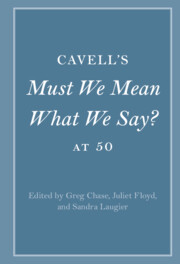Book contents
- Cavell’s Must We Mean What We Say? at 50
- Cambridge Philosophical Anniversaries
- Cavell’s Must We Mean What We Say? at 50
- Copyright page
- Contents
- Contributors
- Acknowledgments
- Abbreviations for Cavell’s Works
- Introduction
- Part I Ordinary Language and Its Philosophy
- Part II Aesthetics and the Modern
- 5 “Language-Games” and “Forms of Life”
- 6 Philosophic and Aesthetic Appeal
- 7 Reading Into It or Hearing It Out?:
- 8 Must We Sing What We Mean?:
- Part III Tragedy and the Self
- Bibliography
- Index of Names and Subjects
- Index of References to Cavell’s Works
6 - Philosophic and Aesthetic Appeal
Stanley Cavell on the Irreducibility of the First Person in Aesthetics and in Philosophy
from Part II - Aesthetics and the Modern
Published online by Cambridge University Press: 03 March 2022
- Cavell’s Must We Mean What We Say? at 50
- Cambridge Philosophical Anniversaries
- Cavell’s Must We Mean What We Say? at 50
- Copyright page
- Contents
- Contributors
- Acknowledgments
- Abbreviations for Cavell’s Works
- Introduction
- Part I Ordinary Language and Its Philosophy
- Part II Aesthetics and the Modern
- 5 “Language-Games” and “Forms of Life”
- 6 Philosophic and Aesthetic Appeal
- 7 Reading Into It or Hearing It Out?:
- 8 Must We Sing What We Mean?:
- Part III Tragedy and the Self
- Bibliography
- Index of Names and Subjects
- Index of References to Cavell’s Works
Summary
Cavell proposed that the ordinary language philosopher’s appeals to “what we say when” are to be modeled on aesthetic judgments in Kant’s sense. Both judgments express what Kant called “a universal voice.” However, both also share another feature that stands in tension with their universal purport in being open to seemingly intractable disagreement. Cavell’s insistence – following Kant – that there are judgments with such a logical form is significant, for the idea that there are judgments with this logical form cuts against a prevailing assumption: if a judgment does not enjoy the objectivity of a theoretical judgment, its content must be understood to be constrained by, or be an expression of, psychological or sociological fact.
These claims are essentially first-personal, not transferrable by testimony, are claims“in which” one’s community with others, or lack thereof, can be established, as opposed to claims that are made “about” a community, whether aesthetic or linguistic, from a third-person, anthropological point of view. Blindness to the existence of judgments with this pair of logical features is a form of psychologism about judgment, a failure fully to recognize the irreducibility of the first person, in both its singular and plural forms, in our relation to the world.
Keywords
- Type
- Chapter
- Information
- Cavell's Must We Mean What We Say? at 50 , pp. 103 - 120Publisher: Cambridge University PressPrint publication year: 2022

